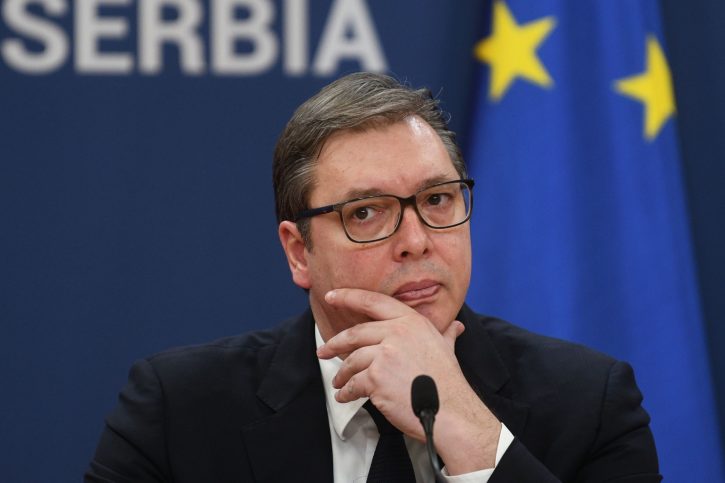
Foto: Nova.rs
For several days now, the most influential European and global media outlets have been reporting on Serbian President Aleksandar Vučić, but not in a positive light, as he might have wished. His name is increasingly associated with concepts such as terror, violence, and the fall of the regime. Although the media around the world are showing how much the situation on the streets of Serbia has spiraled out of control, the European Union remains cautious about the violence that citizens are suffering at the hands of the police. “The media are taking on the role of the European Union, as they will inform the European public about what is happening in Serbia,” foreign policy commentator Boško Jakšić told Nova.
While the authorities in Serbia are trying to stifle the wave of civil unrest with violence, images of brutal scenes on the streets across the country have long since crossed all boundaries. For days, the world’s most influential media outlets have been reporting on mass protests and excessive use of force by the police against citizens, indicating that Serbia is following a scenario unworthy of a democratic society. The tone of their reports clearly condemns the violence and warns that Serbia is sinking deeper into authoritarianism.
Aleksandar Vučić’s regime has been building a system based on fear, repression, and the complete collapse of institutions for years. In a country where courts are turning into an “extension” of the executive branch and parliament into a stage for uniformity, citizens are denied the basic right to freely express their dissatisfaction.
The police, which should protect citizens, has been transformed into an apparatus of repression for the regime. At the same time, the president himself tries to present himself as the only guarantor of stability. His rhetoric boils down to threats, intimidation, and manipulation, while reality clearly shows that he is the one pushing Serbia into conflict.
The fact that influential Western media outlets are writing about Aleksandar Vučić’s repression and that these articles are being signed by editors shows that the anger that Serbian citizens have been feeling for months is spreading beyond our country’s borders.
Global media condemn escalation on the streets of Serbia
The Serbian government is suppressing protests in the country with extreme ferocity. President Vučić is showing his true colors, says Zilke Hane, a journalist for the Tagesschau news portal.
These days, Serbian President Aleksandar Vučić is showing his true colors. Last week, he sent masked thugs to attack the previously peaceful protest movement. And while party supporters attacked demonstrators with sticks and fireworks, the police just stood by and did nothing. Beatings under police protection. Since then, violence on the streets of Serbia has escalated every night. Part of the protest movement has also contributed to this. The offices of the ruling party, which were previously pelted with eggs, are now being demolished and set on fire. The police are intervening – but they are not the only ones arresting these people. Anyone who takes to the streets at night in Serbia to protest against the government – peacefully or otherwise – must expect to be arrested. This civil society is demanding justice – for the victims of the accident in Novi Sad, where a poorly renovated railway station canopy claimed 16 lives. Civil society also wants justice for the victims of police violence. It demands free elections and that the president have only as much power as the constitution prescribes,” says a journalist for the Tagesschau portal, as reported by Deutsche Welle.
After a decade in power, the veterans of authoritarian rule are inevitably faced with the question of whether to intensify repression, strengthen their circle of capitalist friends, and squeeze out the remnants of independent media, or to bow to the opposition’s calls for reform. a choice now also facing Serbian President Aleksandar Vučić, writes the Financial Times.
The editorial team adds that this has been repeated many times around the world in the decades since the Cold War.
“Autocrats almost always choose the first approach and become even more strict. Now, as anti-government protesters take to the streets of the Serbian capital Belgrade, Aleksandar Vučić faces this choice,” writes the Financial Times. “For eight years as president of Serbia, and before that as prime minister, he has ruled with an increasingly interventionist hand, but still leads a more controlled democracy than a complete autocracy.”
On the other hand, the French newspaper Le Monde writes that Vučić has adopted a “strategy of fear” by bringing hooligans and private security guards onto the streets during the protests.
According to the newspaper, clashes between government supporters and protesters have broken out in several cities. Masked attackers vandalized the offices of the Serbian Progressive Party, videos of violent arrests were posted on social media, and the authorities accuse the opposition of trying to “destroy Serbia” and provoke a “civil war.”
“The European Union is partly to blame for everything that is happening in Serbia”
Foreign policy commentator Boško Jakšić told Nova that it is important for the global media to report on events in Serbia because Europe is taking a “wait and see” approach.
“The fact that Serbia has made global headlines at a time when attempts are being made to resolve the war in Ukraine is testament to the seriousness of the crisis. We know this much better than the Western media and, in particular, Western politicians. Europe has long taken a “wait and see” approach, but its reactions and statements of concern about the escalation of violence are completely insufficient as pressure on Aleksandar Vučić to abandon political repression. The media are taking on this role, as they will inform the European public about what is happening. We do not know whether this will have any effect. I must admit that I was once jealous of how much the same Western media wrote about Georgia and ignored what was happening in Serbia. But this is undoubtedly a good thing, because the public can put pressure on their officials,” says Jakšić. Jakšić adds that European officials should think about their actions and how they will explain to the public that Vučić and his regime are acceptable.
“Ursula von der Leyen, who is undoubtedly very sympathetic to Vučić, must consider her electoral base. Other European officials, if the European public is animated and the media helps in this, will have to consider whether they can still tolerate Vučić and how they will explain to their public that everything is fine with Vučić as long as he accepts the excavations and regularly pays the loan installments for Rafale,” says Jakšić, adding:
“This is the cold pragmatism of Europeans, which may ultimately backfire on them. They operate on the principle of ‘better a powder keg in the Balkans outside the European Union than a powder keg inside the European Union’, which has a certain logic. What is obviously missing is why Europeans are no longer concerned that the Western Balkans will become a powder keg and that Serbia will become the autocracy that Vučić has turned it into. This silence on the part of the EU may tomorrow prove to be complicit in everything that is happening, and the citizens of Serbia would be the biggest victims of this cynical policy.
However, the European Union remains conspicuously reticent, even though the global media are raising awareness of the seriousness of the situation in Serbia. Brussels is content with lukewarm statements calling for “restraint on both sides” and “dialogue,” while avoiding openly calling out those responsible for the brutal actions of the police against citizens.
This narrative was used by the head of the EU delegation in Serbia, Andreas von Beckerath, who condemned all forms of hatred and violence and called for a reduction in tensions and respect for fundamental rights.
“The head of the EU delegation condemned all forms of hatred and violence and called on all sides to reduce tensions. Dialogue between actors across the political spectrum was highlighted as the only way forward, while refraining from inflammatory rhetoric and misinformation about the current protests,” the EU delegation said after meeting with Serbian Parliament Speaker Ana Brnabić./Nova.rs/

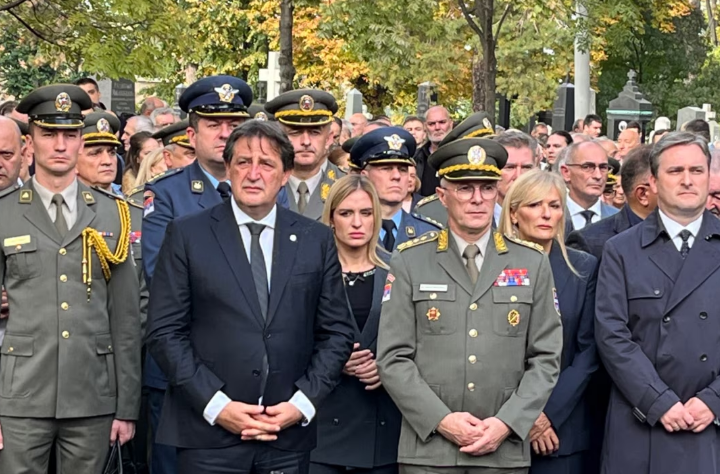 State Honours in Belgrade for a War Criminal
State Honours in Belgrade for a War Criminal  Ukraine and Sweden sign a long-term deal for up to 150 Gripen fighter jets for Kyiv
Ukraine and Sweden sign a long-term deal for up to 150 Gripen fighter jets for Kyiv 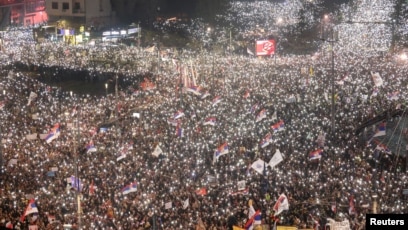 European Parliament draft resolution on Serbia supports citizens’ right to protest
European Parliament draft resolution on Serbia supports citizens’ right to protest 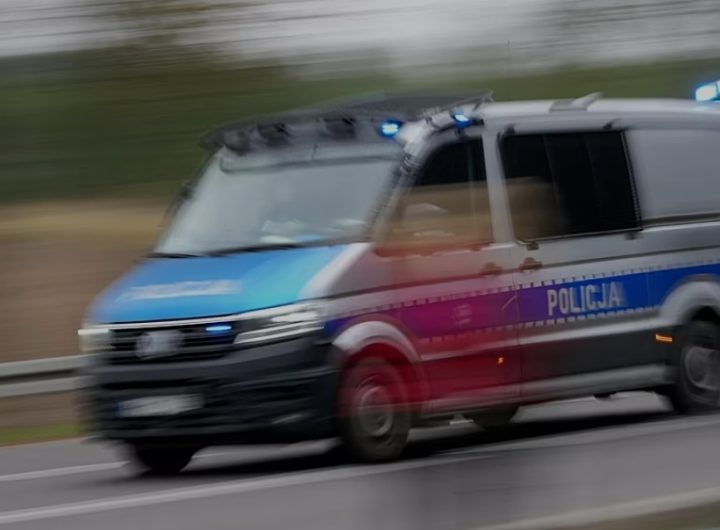 Poland detains eight over suspected Russia-linked sabotage, says PM Tusk
Poland detains eight over suspected Russia-linked sabotage, says PM Tusk 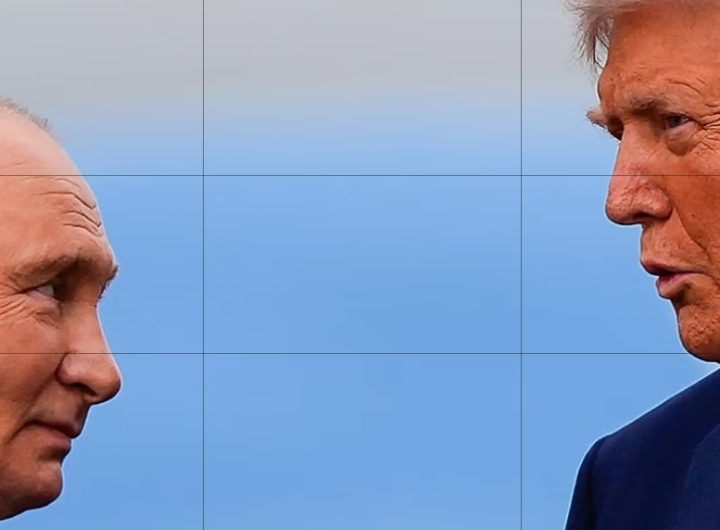 No Trump-Putin meeting in foreseeable future — this is why
No Trump-Putin meeting in foreseeable future — this is why 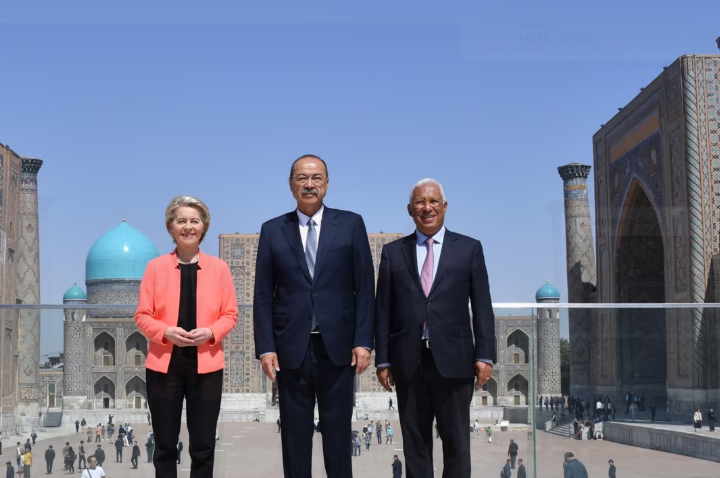 EU Readies New Trade Routes — And A Challenge To Beijing And Moscow — At Luxembourg Summit
EU Readies New Trade Routes — And A Challenge To Beijing And Moscow — At Luxembourg Summit